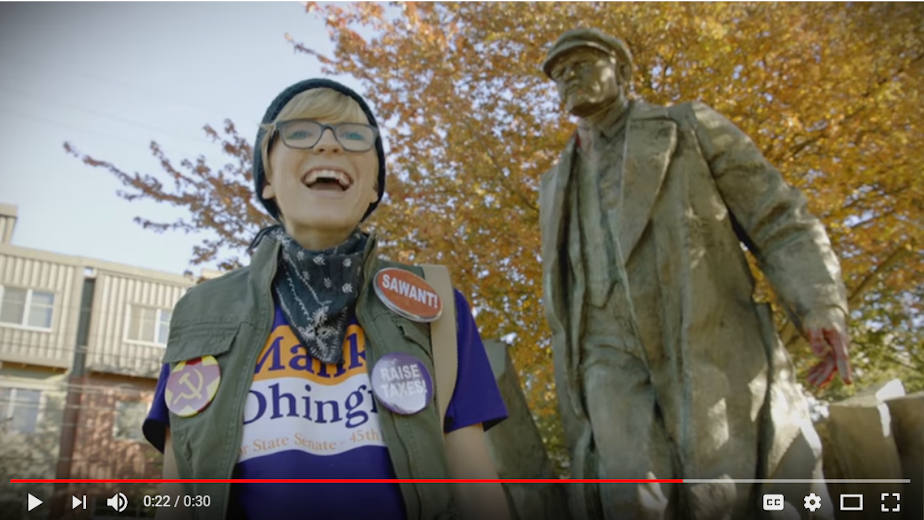Wanted: A good listener who can fix Seattle's image problem

The ad against state Senate candidate Manka Dhingra might be funny if it wasn’t so telling.
“Hey, Eastside. It’s Seattle. We don’t have enough liberal politicians,” says a young woman wearing a “raise taxes” button.
“Do Seattle a solid. Send Manka Dhingra to the Senate,” says a bearded man wearing plaid.
“Manka Dhingra will give us free stuff. I love free stuff,” says a gray-haired woman dressed like a hippie.https://www.youtube.com/watch?time_continue=1&v=TjjZmn-7IAk
The ad is full of other stereotypes about Seattle. Cars aren’t welcome. The city looks down at those Eastside soccer moms. And of course, higher taxes.
Sponsored
It all goes to show just how big of a divider Lake Washington has become.
Bill Radke recently talked to Crosscut's Knute Berger about his idea that Seattle should get itself an ambassador who could spend time listening and learning in other communities. Berger said the city faces resentment from all across the state and it’s time for Seattle to take a more regional approach to planning.
“We’re the 800-pound gorilla economically and politically,” Berger said. “Nobody likes the 800-pound gorilla. At least not since Bobo.”
(Here’s who that is, in case your Seattle history is a little rusty.)
Berger, who once lived on the Eastside, said he thinks the ad is funny and loathsome at the same time. And it’s loaded with hints about snobs and freeloaders.
Sponsored
What about that woman who loves “free stuff,” for starters?
“I think it’s a kind of dog whistle about welfare and about people who aren’t responsible, you know, that kind of thing,” Berger said. “And of course, that’s preposterous because we are a net donor of tax money to the rest of the state. They’re not giving us free stuff. We’re giving them free stuff.”
But he still thinks there’s some truth in the criticism.
“I think some of it’s fair,” he said. “The 800-pound gorilla does get what it wants. Often, not always. And sometimes that’s really important. I mean, we are a huge piece of the economic engine that runs the state.”
Berger wrote in his column:
Sponsored
“Seattle has long been seen as a selfish regional player. That mostly stems from our 800-pound gorilla status, and throwing our weight around. But it’s also from Seattle demanding special treatment, including expensive state-funded solutions (see Bertha) or extending construction timelines — it’s not lost on many that the Eastside portion of the new 520 expansion is done, but the Seattle portion connecting to I-5 is still in progress.”
Berger went on to say that it’s time for Seattle to stop only looking out for itself. He thinks the city needs an ambassador who can spend time visiting other communities, listening and finding ways to build partnerships.
He told Radke that Seattle needs to stop competing. This isn’t the frontier days anymore, when Seattle had a fierce rivalry with other Puget Sound towns for trade dominance.
“I just think we’re still stuck in a 19th-century attitude,” Berger said. “And the 19th-century attitude was, there’s going to be one great city on Puget Sound. And it’s going to be me.”
Now, a more region-focused approach to success would be beneficial to the whole state, Berger said.
Sponsored
“Maybe we have to recognize that the big city on Puget Sound is Pugetopolis.”
Produced for the web by Amy Rolph.

